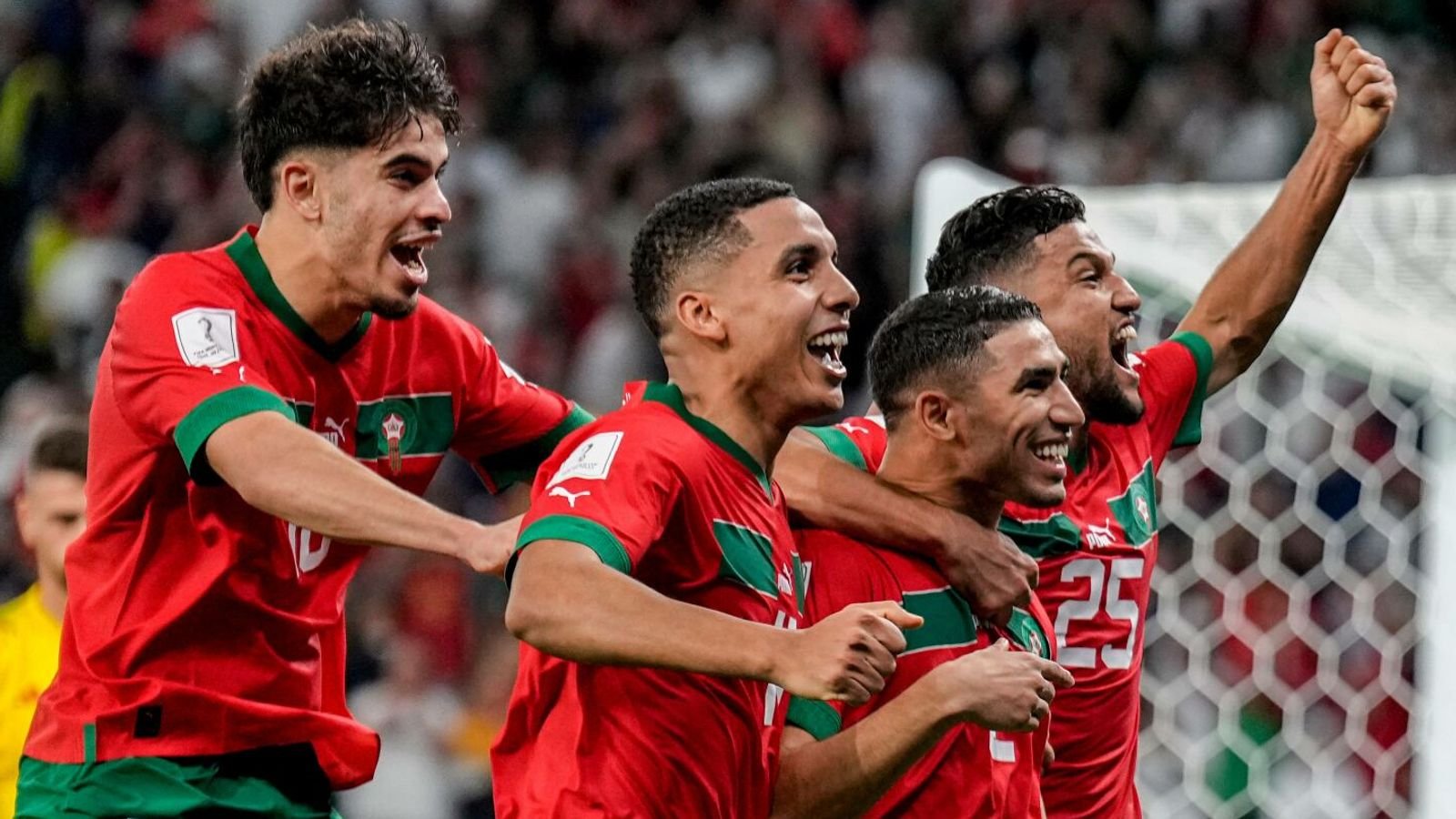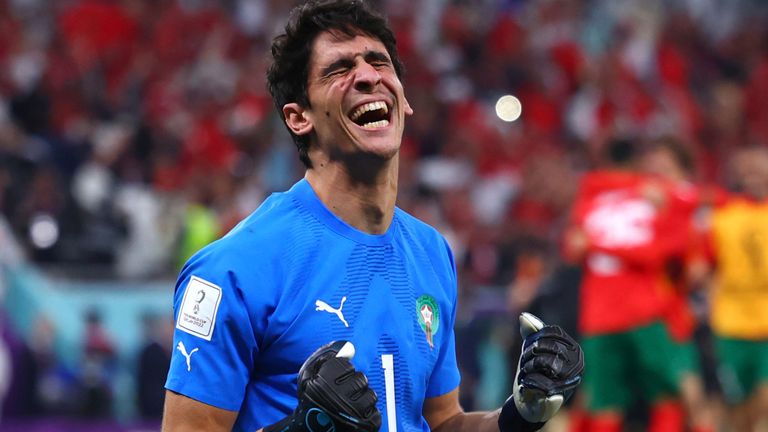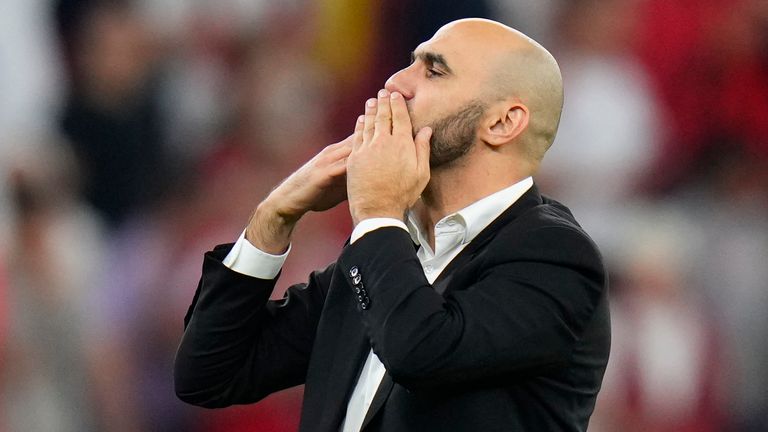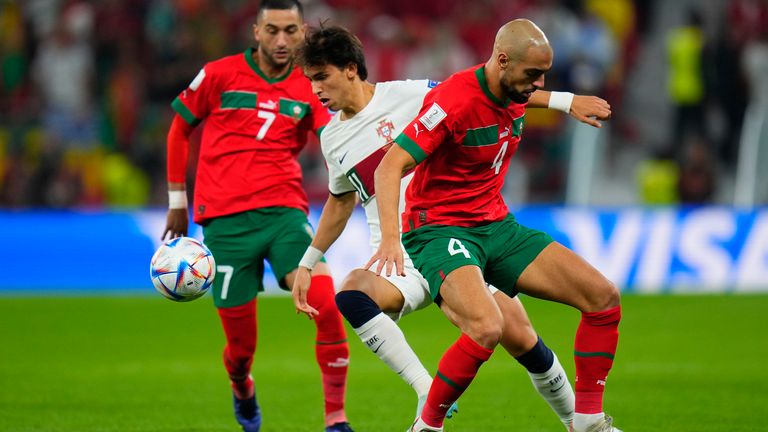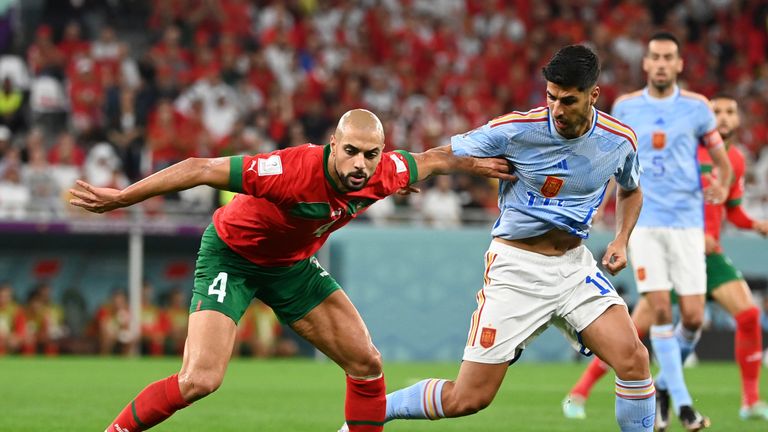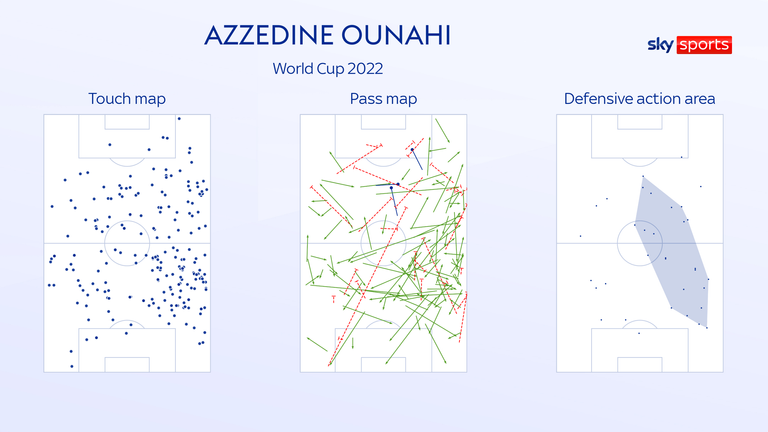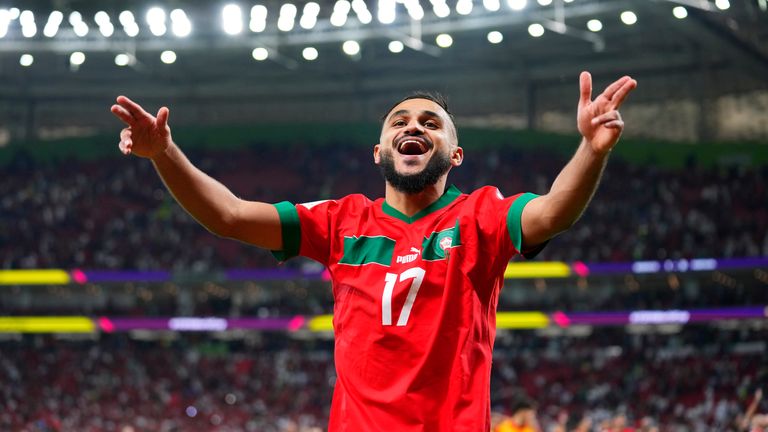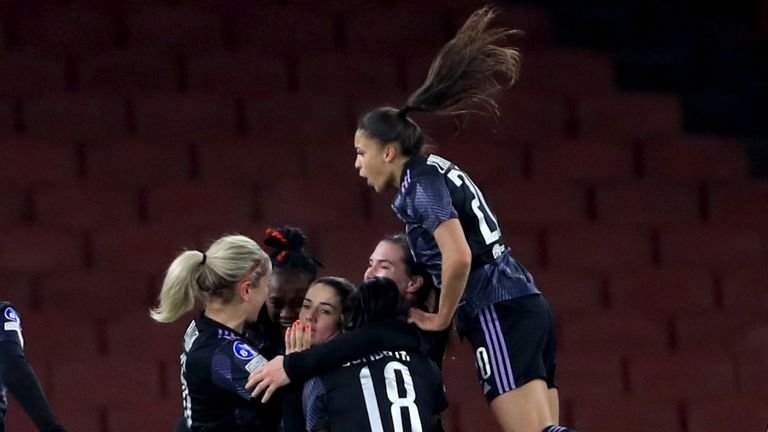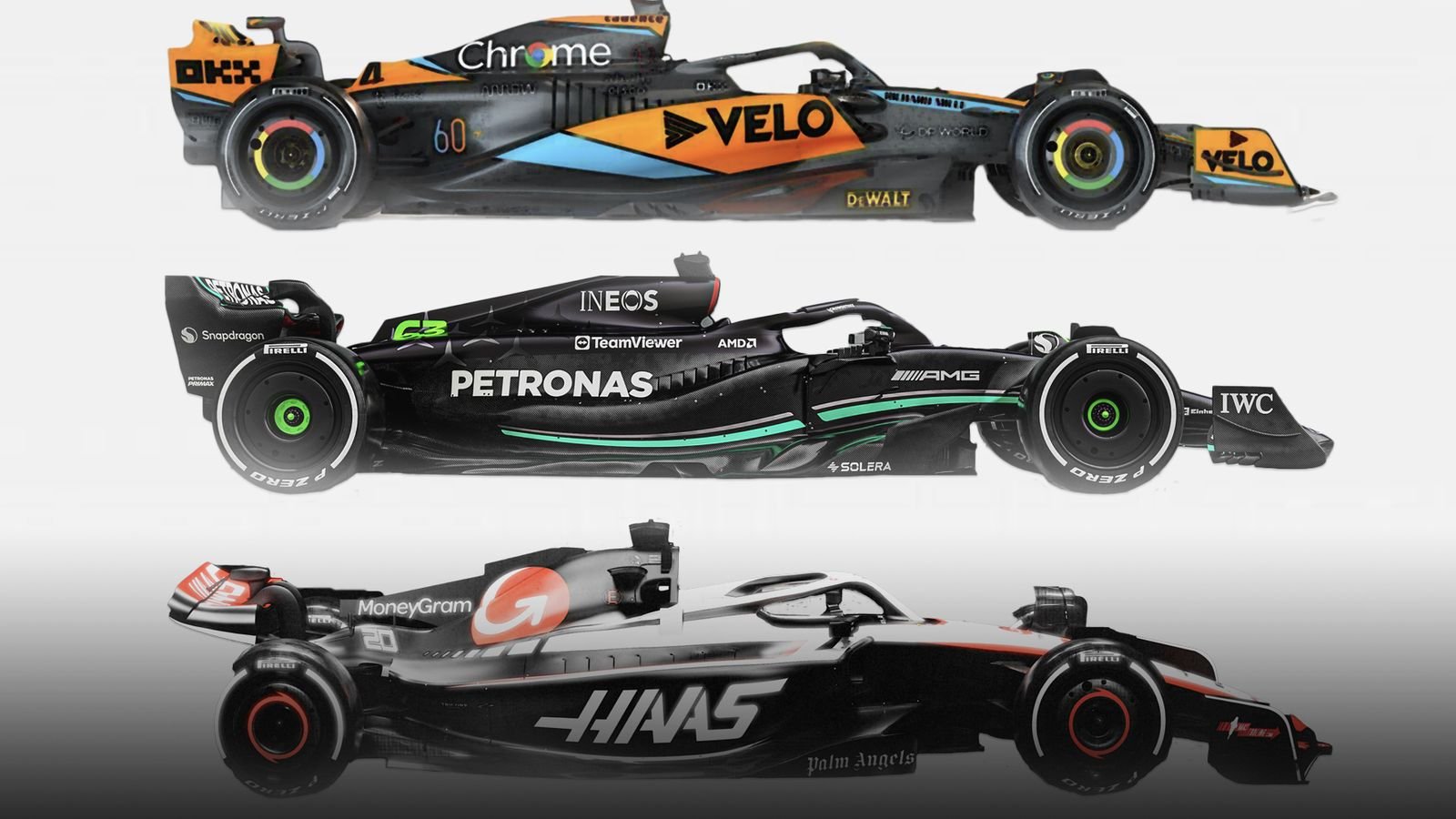[ad_1]
Morocco made history by becoming the first African side to reach the World Cup semi-finals and there are plenty of reasons why the Atlas Lions are not to be underestimated.
Morocco overcame Portugal 1-0 to set up a semi-final against France on Wednesday, having already defeated Belgium, Canada and Spain in Qatar.
However, Walid Regragui’s team will head into their next game once again as underdogs.
“Do not take them lightly,” said Graeme Souness on ITV at full-time. “They will not be a different Morocco next time, they will play the exact same way.”
And there are numerous reasons why it would be a huge mistake to write Morocco off.
Success built on defensive prowess
Morocco’s run to the last four has been built on rock-solid foundations. Remarkably, they have only conceded once in five games so far. And even that came in the form of a Nayef Aguerd own-goal.
No opposition player has managed to get one past goalkeeper Yassine Bounou – known simply as Bono. Spain couldn’t even beat him in a penalty shootout, missing all three of their efforts following the goalless draw, with two of them saved.
The 31-year-old is doubtless a strong contender for the Golden Glove award, but he has been helped by the players in front of him. Incredibly, Morocco have limited their opponents to just nine shots on target across five games so far.
It is all the more impressive when you consider how much of the ball their opponents have had.
Morocco have had just 31.6 per cent possession so far – the second-lowest average of all 32 teams to have featured in the tournament – and yet they rarely even look like conceding.
Walid Regragui has only been in charge for three months, but somehow his side are supremely well organised, expertly keeping their opponents at arm’s length due largely to an outstanding defensive shape.
Their task is likely to be harder in the semi-finals, with Romain Saiss seemingly set to join first-choice centre-back partner Aguerd on the sidelines having sustained an injury in the second half of the win over Portugal.
But Morocco looked no weaker with Jawad El Yamiq drafted into the starting line-up – or when Achraf Dari, ostensibly their fifth choice in the position, had to come on in place of Saiss.
Harry Kane or Kylian Mbappe might fancy their chances against that makeshift pairing, assuming Aguerd and Saiss do not miraculously recover in time, but they are shielded by the formidable Sofyan Amrabat, who has been outstanding in holding midfield, and they also have a world-class right back in Achraf Hakimi.
Over at left back, first-choice Noussair Mazraoui, of Bayern Munich, was absent against Portugal, meaning Yahya Attiat-Allah had to step in. Again, though, it made little difference.
Morocco’s defensive prowess is down to the collective rather than any individual.
Brave and brilliant in possession
It would be a grave error to look at Morocco’s possession numbers and assume they are a poor footballing side. On the contrary, they are technically excellent and ambitious on the ball. They have shown it throughout the tournament.
It was evident in the way they invited Spain to press them high up the pitch in the last 16, with Regragui’s side playing out from the back with the kind of boldness you would usually associate with Spain themselves.
It worked, too. Morocco cut through Luis Enrique’s side on several occasions after Bono opted to go short. Then, once the press was beaten, they flew forward at speed, making the most of any numerical advantages they had gained by drawing Spain upfield.
Morocco did not get the goal their performance deserved against Spain, but they lured Portugal into the same trap.
It almost yielded a goal when Selim Amallah blazed over following a slick move which started with Achraf Hakimi near Morocco’s goal line, but Morocco didn’t have to wait long for the approach to pay off.
In fact, their goal arrived in similar circumstances only seven minutes later, Youssef En-Nesyri heading home Attiat-Allah’s left-wing cross following a sequence of passes lasting well over a minute and involving more than half the Morocco team.
Morocco may have only scored three times in five games so far in Qatar – excluding their penalty shootout – but that total should be considered deceptive. They have shown they can hurt the top teams – and do it in style too.
Amrabat, Ounahi, Boufal offer individual excellence
Morocco’s strength lies in the collective, but they are not light on individual talent either.
Fiorentina midfielder Sofyan Amrabat has been outstanding in the centre of the park, putting out fires in front of his back line and then starting counter-attacks, impressing in particular in his side’s win over Spain.
Recent reports suggest Liverpool are monitoring the 26-year-old with a view to possibly signing him in January.
To the right of Amrabat in Morocco’s midfield three, there is an arguably even more exciting player. Azzedine Ounahi was playing in France’s third tier only 18 months ago, but he has been a revelation in Qatar.
Luis Enrique certainly thought so. “Madre mía, where did this kid come from?” said the now former Spain boss after Ounahi helped dump La Roja out of the competition. “He can really play,” he added.
The 22-year-old was excellent in that game, showing his industry as well as his technical quality as he covered a total of 14.7km before his 119th-minute withdrawal – the most by any player on either side.
He was similarly impressive against Portugal, with most of Morocco’s best attacking moments going through him, just as they did against Spain. He was something of an unknown going into the tournament, but not any more.
Ounahi plays his club football for Angers in Ligue 1 and so does winger Sofiane Boufal, another outstanding performer for Morocco during the tournament.
The former Southampton star has impressed in Morocco’s route to the semi-finals with his eye-catching and elusive dribbling, which has at times helped relieve the pressure on his side – in fact, his 2.4 dribbles on average per game are more than any of his team-mates, while France forward Kylian Mbappe is the only player still active in the tournament that has dribbled more times per match.
[ad_2]
Source link

